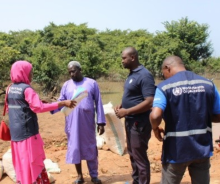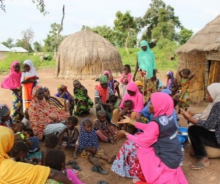Kwara State bolsters strategy to curb Yellow fever scourge
Ilorin, 13 December, 2022 - Akwai zafi? meaning does it hurt (in Hausa language), asks Abdulafar Ahmed, jokingly as he administered the Yellow fever vaccine to some of the children at Ruggar Budo (a nomadic) settlement in Gwaria ward of Kaiama Local Government Area (LGA), in Kwara State Nigeria.
Mr Ahmed is one of the vaccinators administering the yellow fever vaccines and other life-saving routine immunization (RI) vaccines to children under one at the nomadic settlements in Kaiama LGA.
Kaiama LGA hosts many nomadic settlements and is a hard-to-reach and security-compromised area in Kwara state. Getting to the settlements requires health workers to travel on bad roads, canoes and bikes.
Mr Ahmed says, “the Yellow fever outreach is a reactive response to the suspected and confirmed case of yellow fever in the locality.
“Recently, a confirmed case of Yellow fever was reported in a six-year-old girl, Khadijah Issah, from Ruggar Budo. This spurred the intervention and the team leveraged the exercise to administer other RI immunization to the children, especially those who had missed out on their immunization schedule.
Children between 9-12 months received the Yellow fever vaccine, while children under one were given other vitals. In total, 81 children received life-saving vaccines. The Yellow fever vaccine will avert the transmission of the disease among the people in the community and state at large,” he says.
Curbing transmission
To curb the spread of the Yellow fever disease, the World Health Organization (WHO) has been supporting the state government to conduct a reactive yellow fever vaccination drive to prevent the transmission of the disease.
The WHO Kwara State Coordinator, Dr Salihu Abdullahi says Kadijah’s case was notified through the Auto-Visual AFP Detection and Reporting (AVADAR), by a community informant during a routine community sensitization exercise at the settlement.
According to him, after Khadija’s case, six other suspected cases were notified in the communities.
“After we received the notification of the cases, WHO supported the collection and transportation of samples to the laboratory, conducted community sensitization campaigns on the importance of RI and environmental hygiene, and led a RI survey to ascertain the level of immunization coverage in the locality. It was also observed that some children in the locality had missed out on the 2018 yellow fever mass vaccination campaign.
To remedy the situation, WHO supported the state with the re-active vaccination of the communities with Yellow Fever vaccines and integrated the RI vaccine service to the vulnerable population.
Furthermore, posters on yellow fever and case definition were distributed and placed in strategic places”, he said.
Appreciating WHO for its swift intervention, the Head of Department-Primary Health Care, Alhaji Bashir Muhammed said WHO has been a reliable partner with the organization and implementation of immunization services and provision of quality health interventions in the LGA as well as the state.
“In Kaiama LGA, the provision of health services, like immunization is often encumbered by hard-to-reach settlements, mobile populations, and poor road accessibility among others, but WHO has been steadfast in providing quality life-saving interventions to the people.
This has been evident in the recent yellow fever intervention with the quality of investigation, surveillance and response to the outbreak”, he says.
From 01 January to September 30 2022, a total of 1,601 suspected cases of Yellow fever have been reported from 463 LGAs in 36 states and the Federal Capital Territory (FCT).
In Kwara state, 29 cases were reported since the beginning of the year, including the case from Kaiama LGA.
Yellow fever is an acute viral haemorrhagic disease transmitted by infected mosquitoes. The “yellow” in the name of the disease refers to jaundice ( yellow colour eyes) that affects some of the infected patients.
Nigeria had in 2020 and 2021, through the Eliminate Yellow Fever Epidemics (EYE) strategy, a partnership between WHO, UNICEF and GAVI, the Vaccine Alliance and the government, over 45 million people were vaccinated using a preventive and reactive mass vaccination campaigns despite the COVID-19 pandemic.
Technical Contacts:
Salihu Abdullahi; Email: salihua [at] who.int (salihua[at]who[dot]int)
Tugumizemu, Victor; Email: tugumizemuv [at] who.int (tugumizemuv[at]who[dot]int)





